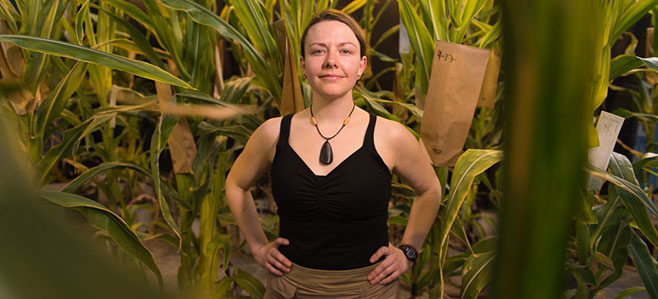
Surrounded by plants in a UW-Madison greenhouse, Tessa Peters is in her element. Her love of the land and plant breeding sent her career plans careening from geophysics, the study of the earth and its environment in space, to agroecology, the study of the ecological processes that operate in agricultural production systems.
A graduate student studying in the College of Agricultural and Life Sciences (CALS), Peters received an organic plant breeding fellowship, funded by the Clif Bar Family Foundation, which selected the UW to receive one of only four organic plant breeding fellowships that it granted last year—the first such fellowships ever awarded in the United States.
As a young geophysicist Tessa Peters sailed around the world, mapping the ocean floor from aboard a large ship. But on shore leave in various countries, she discovered a passion that was deeply rooted to the land.
“I found myself staying on farms or talking to farmers and trying to find out about the local food system where I was visiting,” Peters said.
Her pursuit of that interest included a stint on an organic farm in Ecuador and returning to school for a bachelor’s degree in agroecology. Last fall, she became a graduate student in the University of Wisconsin-Madison’s plant breeding and plant genetics program in CALS.
Peters chose CALS based on the program’s strength and faculty efforts in organic plant breeding. Agronomy Professor and Department Chair Bill Tracy, for example, breeds sweet corn for organic farming systems in addition to his work with conventional sweet corn.
Breeding efforts are needed to feed the demand for organic food, which for more than a decade has been the fastest growing segment of the American food industry—yet little has been done to breed plant varieties designed to flourish in organic growing conditions. “There are opportunities and needs out there that aren’t being met,” explained Tracy, who serves as Peters’ advisor.
As a Seed Matters Fellow in Organic Plant Breeding, Peters will be in the vanguard of young professionals being trained to fill that gap. The fellowship provides Peters with five years of support.
Now in her second semester, Peters has embarked on research working with organic sweet corn to address several major problems growers face. Her efforts will include breeding for plants that can grow densely as a means to inhibit weed growth, thus reducing the need for labor-intensive weeding.
“Organic farmers face many challenging issues that haven’t been adequately addressed by the plant breeding community to date,” Peters said. “It’s exciting to know that I am working toward helping them achieve a more successful, sustainable future as the movement grows.”
[ar12]
